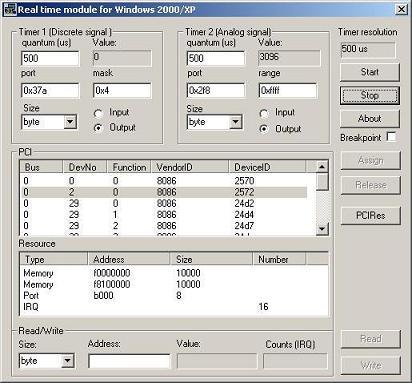
Introduction
For a variety of business and technical reasons, Microsoft Windows Vista, XP/2000 operating systems are increasingly being considered as a platform for deployment of real-time systems. The reasons include:
- The many applications available on the platform
- The variety of development tools available on the platform
- The richness of the Microsoft Win32 application programming interface (API)
- The large number of developers, support personnel, and end users who are familiar with the system
The Hadcon's real time module (RTM) has been developed to bring "hard" real time capabilities (such as creation of timers, system thread, of management by resources – memory, ports, interrupts) to Windows, excepting necessity of creating of the driver.
RTM Architecture
Precise execution of events is critical in a real-time system. RTM provides complete flexibility to the developer to determine the appropriate timer resolution for their system. Timer interval values can be set between 100 microsecond and 1 millisecond (100,200,500,1000). The timer interval is default inside of [AddNewInst] section rtmdrv.inf file's HKR,,TimerQuantum,,500.

RTM uses the "mixed" code, i.e., timer's, interrupt's routines (working in Ring 0) and user routines (working in Ring 3) are incorporated in one DLL module.
Real-time components (timer, system thread and interrupt routines) must be locked in memory to avoid latencies due to page faults. Therefore RTM defines its own sections for location of a code, data and stack using the data_seg, code_seg, and bss_seg pragmas.
#pragma code_seg( "RTMCODE ")
Specifies a code section where functions are to be allocated.
For example:
#pragma code_seg( "RTMCODE ")
void timer1(unsigned dwmess )
{
..................
}
#pragma code_seg()
#pragma data_seg( "RTMDATA ")
Specifies a code section where initialized data are to be allocated.
For example:
#pragma data_seg( "RTMDATA ")
char buff[10] = {0};
int k1 = 0;
#pragma data_seg()
#pragma bss_seg( "RTMBSS ")
char buff[10];
int k1;
#pragma bss_seg()
Timers
RTM uses the system timer. The system timer generates system ticks at a fixed rate of one tick per millisecond (or 100, 200 ,500 microsecond), which is the rate at which a timer interrupt is generated and serviced by the operating system (interrupt service routine ISR).
RTmCreateTimer function lets you attach a handling routine to an timer interrupt, much the same way that the RTM timer routines allow you to associate a handling routine with a given timer expiration.
RTM timers are not synchronization objects which means threads cannot wait for single objects with an RTM timer handle.
This is in contrast to the Windows waitable timer, which is an object on which a thread can wait, or against which a thread can receive notification.
Example Code
#pragma code_seg( "RTMCODE ")
void timer1(unsigned dwmess )
{
int i;
unsigned nstate;
unsigned nvalue;
unsigned short ndigport;
if(nstop ) return ;
if(initLpt == 0)
{
_asm {
mov dx,378h
mov ax,0
out dx,ax ; add dx,2; CR
mov ax,2eh
out dx,ax ; }
initLpt =1;
rtmsqrt(1.5);
..................
}
#pragma code_seg()
void func()
{
int error;
HANDLE tm;
if(RtmInit(hRTMDLL,KERNEL_MODE) == -1) return 0;
RtmDebug(hRTMDLL ,TRUE);
tm = RtmCreateTimer
(hRTMDLL ,timer_anl,0x2000,stanl.quantum,KERNEL_MODE);
RtmStartTimer(hRTMDLL ,tm,0x3000);
error = RtmTimerPostMessage(hRTMDLL ,tm,0x100);
}
Using Threads
The RtmCreateThread function creates a system thread (See: PsCreateSystemThread in the DDK for Windows XP/2000).
You can set the priority value for the specified thread using KeSetPriorityThread and KeSetBasePriorityThread functions.
Inside of the body thread function, we can use majority DDK functions.
RTM thread defines own sections for location of a code.
#pragma code_seg( "RTMTHR ")
#pragma code_seg()
Example Code
#pragma code_seg( "RTMTHR ")
void writetofile(PWSTR pfl,UINT addr,int nsize)
{
IO_STATUS_BLOCK IoStatus;
OBJECT_ATTRIBUTES objectAttributes;
HANDLE FileHandle = NULL;
UNICODE_STRING fileName1;
NTSTATUS status;
fileName1.Buffer = NULL;
fileName1.Length = 0;
fileName1.MaximumLength = 256;
DbgPrint("start");
fileName1.Buffer = (unsigned short *)ExAllocatePool(PagedPool,
fileName1.MaximumLength);
DbgPrint("111");
RtlZeroMemory(fileName1.Buffer, fileName1.MaximumLength);
status = RtlAppendUnicodeToString(&fileName1, pfl);
InitializeObjectAttributes (&objectAttributes,
(PUNICODE_STRING)&fileName1,
OBJ_CASE_INSENSITIVE,
NULL,
NULL );
status = ZwCreateFile(&FileHandle,
FILE_APPEND_DATA,
&objectAttributes,
&IoStatus,
0,
FILE_ATTRIBUTE_NORMAL,
FILE_SHARE_WRITE,
FILE_OPEN_IF,
FILE_SYNCHRONOUS_IO_NONALERT,
NULL,
0 );
if(NT_SUCCESS(status))
{
ZwWriteFile(FileHandle,
NULL,
NULL,
NULL,
&IoStatus,
(void *)addr,
nsize,
NULL,
NULL );
ZwClose(FileHandle);
DbgPrint ("Close file");
}
if(fileName1.Buffer)
ExFreePool(fileName1.Buffer);
}
int systhread(void *param)
{
unsigned int _cr3 = 0;
PVOID pv;
PHYSICAL_ADDRESS pf;
n_count_task++;
if(n_count_task == 10)
{
_asm mov eax,cr3
_asm mov _cr3,eax
pf.HighPart = 0;
pf.LowPart = _cr3;
pv = MmGetVirtualForPhysical (pf);
writetofile(L"\\??\\C:\\tmp\\qqq1",(UINT)pv ,0x1000);
}
return 0;
}
#pragma code_seg()
void func()
{
int error;
HANDLE tm;
HANDLE th;
if(RtmInit(hRTMDLL,KERNEL_MODE) == -1) return 0;
th = RtmCreateThread(hRTMDLL ,(THREAD_START_ROUTINE)systhread,NULL);
}
Interrupts
RTM allows a process to directly interface with a device without having to write a Windows driver via RtmConnectInterrupt or RtmHookInterrupt functions. A process can attach to an interrupt handler using RtmConnectInterrupt function (See: HalGetInterruptVector in the DDK for Windows XP/2000).
The RtmHookInterrupt function allows to hook an interrupt.
typedef struct _tagRTMINTERUPT {
INTERFACE_TYPE itype;
ULONG nVector ;
ULONG BusNumber ;
ULONG VenID ;
ULONG DevID;
unsigned char bShared;
void *lpParameter;
INTERRUPT_ROUTINE newintr;
) RTMINTERRUPT;
Example Code
#pragma data_seg( "RTMDATA ")
int _isr = 0;
#pragma data_seg()
void newintr(void *pv)
{
_isr++;
}
int func1()
{
HANDLE tm; int count;
RTMCONNINTERRUPT cinter;
HANDLE pi,pi1;
if(RtmInit(hRTMDLL, KERNEL_MODE) == -1) return 0;
cinter.BusNumber = 1;
cinter.DevID = 0x2f00;
cinter.nVector =0;
cinter.VenID = 0x14f1;
cinter.itype = PCIBus;
cinter.lpParameter = NULL;
cinter.newintr = newintr;
pi = RtmConnectInterrupt(hRTMDLL ,&cinter);
cinter.BusNumber = 0;
cinter.nVector =1;
cinter.itype = Isa;
cinter.lpParameter = NULL;
cinter.newintr = newintr;
pi1 = RtmHookInterrupt (hRTMDLL ,&cinter);
count = _isr;
count = _isr;
count = _isr;
RtmUnhookInterrupt (hRTMDLL ,pi1);
}
E-mail: info@hadcon.ru
URL: http://www.hadcon.ru
